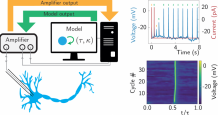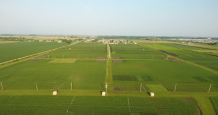News archive 2021

High-profile event showcases pivotal role Environmental Intelligence plays on road to ‘net-zero’
The pivotal role that Environmental Intelligence will play in delivering the UK’s ‘net zero’ ambitions will be showcased in a high-profile special event, later this month.

Rainfall in the Arctic may soon be more common than snowfall
More rain than snow will fall in the Arctic – and this transition will occur decades earlier than previously predicted, a new study reports.

Environmental Intelligence commitment at COP26
The Met Office and the University of Exeter have signed a landmark collaboration agreement at COP26, formally committing to further grow the work of the Joint Centre for Excellence in Environmental Intelligence.

Exeter academics on list of top researchers
Twenty-two University of Exeter academics have been named on an annual list of highly cited researchers.

Exeter researchers give COP26 verdict
University of Exeter researchers have given their views on the COP26 climate change conference.

High-impact climate events: Better adaptation through earlier prediction
The prediction of high-impact climate phenomena can be substantially improved by a new mathematical approach that analyses the connectivity and patterns between geographical locations, scientists say in a new publication.

Tech-based health and exercise programmes less beneficial for users with low socio-economic status, study shows
Technology-based health and exercise programmes and apps, designed to offer a convenient and accessible way to boost physical activity, are dramatically less beneficial for users with low socio-economic status, a study has shown.

Exeter plays pivotal role in new digital hub
The University of Exeter will play a pivotal role in a pioneering new digital hub, designed to help organisations respond to the climate and environment emergency, and improve public health.

£2.5 million investment in 35 new PhD studentships
The University of Exeter is investing £2. 5 million in preparing the next generation of researchers to tackle some of the biggest global issues of the 21st century.

Global carbon emissions rebound close to pre-Covid levels
Global carbon emissions in 2021 are set to rebound close to pre-Covid levels, according to the Global Carbon Project.

Scientists from Exeter and Bangkok to collaborate on a new project on floods and droughts in Thailand
The team of researchers from College of Engineering, Mathematics and Physical Sciences have been awarded a new NERC grant under the COP26 Adaptation and Resilience theme.

Reviews highlight consequences of failing to tackle climate change
A set of scientific reviews published today reinforces the urgent need for global action to reduce the impact of climate change on vital carbon sinks, our oceans and the Arctic.

Exeter student wins prestigious national award
A student at the University of Exeter has received a prestigious national award, which recognises her as one of the ‘rising stars’ in the British space sector.

Climate denial and scientific discoveries 'emerged simultaneously'
Denial of climate science emerged simultaneously with key scientific discoveries about humanity's impact on our planet, according to a new book.

Climatic impacts of black carbon aerosols over South-East Atlantic underestimated, research shows
The full magnitude of the impact of smoke from seasonal fires in Central Africa is underestimated by some climate models over the South-East Atlantic, new research has shown.

Almost one-in-three people globally will still be mainly using polluting cooking fuels in 2030, research shows
Almost one-in-three people around the world will still be mainly using polluting cooking fuels and technologies– a major source of disease and environmental destruction and devastation – in 2030, new research warned.

JCEEI to play integral role in pioneering resilient infrastructure partnership
Experts from the Joint Centre for Excellence in Environmental Intelligence (JCEEI) will play an integral role in a pioneering new partnership, designed to boost the UK’s infrastructure resilience to extreme climate and weather events.

Landmark CFC ban gave planet fighting chance against global warming, research shows
Without the global CFC ban we would already be facing the reality of a ‘scorched earth’, according to researchers measuring the impact of the Montreal Protocol.

Major Atlantic Ocean current system may be approaching critical threshold, research shows
A major current of the Atlantic Ocean – which acts like a global-scaled conveyor belt and includes the Gulf Stream - may have been losing stability over the last century, research has shown.

Climate 'tipping points' need not be the end of the world
The disastrous consequences of climate "tipping points" could be averted if global warming was reversed quickly enough, new research suggests.

Research breakthrough in understanding how neural systems process and store information
A team of scientists from the University of Exeter and the University of Auckland have made a breakthrough in the quest to better understand how neural systems are able to process and store information.

Variant B.1.1.7 of COVID-19 associated with a significantly higher mortality rate, research shows
The highly infectious variant of COVID-19 discovered in Kent, which swept across the UK last year before spreading worldwide, is between 30 and 100 per cent more deadly than previous strains, new analysis has shown.

Tenfold increase in CO2 emissions cuts needed to stem climate emergency
New research shows 64 countries cut their fossil CO2 emissions during 2016-2019, but the rate of reduction needs to increase tenfold to meet the Paris Agreement aims to tackle climate change.

Exeter Professor selected for EPSRC’s Strategic Advisory Network
One of the University of Exeter’s foremost experts in using Mathematics in Biomedicine and Healthcare has been selected to join a prestigious national advisory group.

Research shows how single celled algae rotate as they swim towards the light
Scientists have made a pivotal breakthrough in the quest to understand how single-cell green algae are able to keep track of the light as they swim.

New research studies “domino effects” and synchrony in brain activity
Scientists have made a significant breakthrough in the quest to understand the intricate processes that occur in the brain during seizures that are the key symptom of epilepsy.

Improved model estimates impact of ozone on soy crops
The impact of ozone on soybean production can be predicted more accurately thanks to improvements to a computer modelling system.

Pioneering research unravels hidden origins of Eastern Asia’s ‘land of milk and honey’
A study has revealed for the first time the ancient origins of one of the world’s most important ecosystems.

Ongoing sudden stratospheric warming could increase risk of snow over coming weeks
A pioneering new study helps shed light on the chances of extreme cold, and potentially snow in the UK in the next fortnight.
